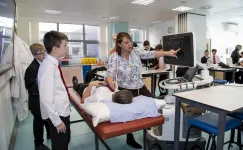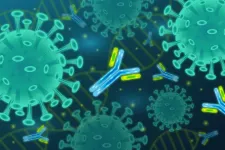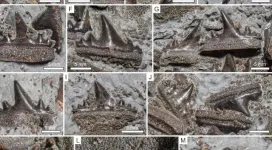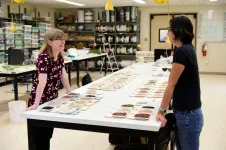(Press-News.org) A study by the University of Southampton has shown its LifeLab programme, aimed at improving adolescent health through hands-on learning, significantly increases young people's understanding of what it means to lead a healthy lifestyle.
Led by a team from both the Faculty of Medicine and Education School at the University of Southampton, the LifeLab programme aims to encourage engagement with the science behind public health messages, to support development of health literacy alongside decision-making skills and promotion of adolescents' sense of control over their lives and futures. Based at University Hospital Southampton (UHS) NHS Foundation Trust, LifeLab is a state-of-the-art teaching laboratory dedicated to improving adolescent health through science engagement.
Latest research, published in the journal PLOS ONE1 and funded by the British Heart Foundation, has found that participation in LifeLab was associated with an increase in students' health literacy 12 months later. There was also evidence that participants subsequently judged their own lifestyles more critically than students who had not taken part in the programme.
Health literacy can be described as having the knowledge, skills, understanding and confidence to use health and care information and services and to apply these to lifestyle choices. Increasing evidence suggests that adolescence is a critical developmental stage during which lifelong health literacy can be established, offering a potential window of opportunity during which improvements in health literacy could benefit long-term health, and enable preparation for parenthood - passing on good health prospects to future children.
The randomised controlled trial was conducted in 38 secondary schools in England, drawing on principles of education, psychology and public health to engage students with science for health literacy, focused on the message 'Me, my health and my children's health'. The programme comprised a professional development day for teachers, a two to three week module of work for 13-14-year-olds and a 'hands-on' practical health science day visit to a dedicated facility in a university teaching hospital. Information was collected from 2929 adolescents aged 13-14 years, at baseline and 2487 at follow-up 12-months later.
"Experiencing LifeLab led to improved health literacy in adolescents and a move towards a more critical judgement of health behaviour 12 months after the intervention," said Dr Kath Woods-Townsend, who leads the LifeLab programme. "By providing opportunities linked to the National Curriculum, and which meet schools' needs, we have shown that students can be successfully engaged with the science behind the health messages, with lasting benefits for their health literacy."
Sharing her thoughts, Professor Hazel Inskip, principal investigator on the study from the Medical Research Council Lifecourse Epidemiology Unit at the University of Southampton, said: "The importance of health literacy in young people is being increasingly recognised, but there are very few randomised controlled trials seeking to assess interventions that promote health literacy through working in partnership with schools. It is an exciting step forwards to show that such a programme can engage adolescents with science, leading to sustained changes in health literacy and more critical judgement of their own behaviour."
Professor Keith Godfrey, a co-investigator on the study from the National Institute for Health Research Southampton Biomedical Research Centre, commented: "Interventions during adolescence have the potential for a 'triple dividend' of benefits now, into future adult life and for the next generation of children. The LifeLab programme paves the way for enabling young people to access, understand and reflect on what they need to do to live healthier lives."
INFORMATION:
Notes to Editors
1) 'A cluster-randomised controlled trial of the LifeLab education intervention to improve health literacy in adolescents,' is published in the journal PLoS One and can be found at: https://doi.org/10.1371/journal.pone.0250545
2) The University of Southampton drives original thinking, turns knowledge into action and impact, and creates solutions to the world's challenges. We are among the top 100 institutions globally (QS World University Rankings 2021). Our academics are leaders in their fields, forging links with high-profile international businesses and organisations, and inspiring a 22,000-strong community of exceptional students, from over 135 countries worldwide. Through our high-quality education, the University helps students on a journey of discovery to realise their potential and join our global network of over 200,000 alumni. http://www.southampton.ac.uk
3) More about LifeLab can be found at: https://www.southampton.ac.uk/lifelab/index.page
For further information contact:
Peter Franklinn, Media Relations, University of Southampton. Tel: 07748 321087 Email: p.franklin@southampton.ac.uk
http://www.southampton.ac.uk/news/contact-press-team.page
Follow us on twitter: http://twitter.com/unisouthampton
Like us on Facebook: http://www.facebook.com/unisouthampton
The COVID-19 pandemic has now claimed over 2 million deaths worldwide, and this number is only increasing. In response, health agencies have rolled out tests to diagnose and understand the disease. Besides the now widely known PCR test, there is interest in serological (blood) tests that detect "antibodies" against SARS-CoV-2, the virus that causes COVID-19. These blood tests have considerable applications, from identifying blood donors with high levels of anti-SARS-CoV-2 antibodies, whose blood can be used for convalescent plasma therapy, to measuring vaccine effectiveness.
So, what are antibodies? These are proteins produced by the ...
This rare fossil find comes from the Kimmeridge Clay Formation in England, a series of sedimentary rocks that was formed in a shallow, tropical-subtropical sea during the Upper Jurassic, about 150 million years ago. The fossil shark skeleton was found more than 20 years ago on the southern coast of England and is now held in the Etches Collection. Additional fossil shark specimens from it will be investigated in the years to come.
Due to their life-long tooth replacement shark teeth are among the most common vertebrate finds encountered in the fossil record. The low preservation potential of their poorly mineralized cartilaginous skeletons, on the ...
A scientist from HSE University has developed an image recognition algorithm that works 40% faster than analogues. It can speed up real-time processing of video-based image recognition systems. The results of the study have been published in the journal Information Sciences.
Convolutional neural networks (CNNs), which include a sequence of convolutional layers, are widely used in computer vision. Each layer in a network has an input and an output. The digital description of the image goes to the input of the first layer and is converted into a different set of numbers at the output. The result goes to the input of ...
Wastewater testing is an effective way to identify new cases of COVID-19 in nursing homes and other congregate living settings, and it may be particularly useful for preventing outbreaks in college dormitories, a new University of Virginia study finds.
The research, a collaboration of UVA's School of Medicine and School of Engineering, was led by UVA Health's Amy Mathers, MD. It offers some of the first clear guidance on the most effective methods to perform testing to detect COVID-19 in wastewater.
The researchers evaluated and compared sampling and analysis techniques by testing them within buildings with known numbers of positive cases. They were then able to determine wastewater testing's strengths and limitations as a tool for monitoring COVID-19 in a building population. ...
SASKATOON - Tepary beans--a high protein legume common to the southwest United States and Mexico--may hold the key to adapting bean crops for the increasingly harsh conditions brought on by a changing climate, according to research led by University of Saskatchewan (USask) and Michigan State University.
In a study just published in Nature Communications, the researchers found that as the mercury rises to 27oC at night--a temperature devastating for current bean crops--specific genes sensitive to heat stress in the tepary bean get activated, protecting the plant. ...
The investigators used machine learning to predict which patients might get worse and not respond positively to being turned onto their front in intensive care units (ICUs) - a technique known as proning that is commonly used in this setting to improve oxygenation of the lungs.
While the AI model was used on a retrospective cohort of patient data collected during the pandemic's first wave, the study demonstrates the ability of AI methods to predict patient outcomes using routine clinical information used by ICU medics.
The researchers say the approach, where each patient's ...
Alexandria, Va., USA -- Carbon dioxide (CO2) is a byproduct of human metabolism and exists in high levels in exhaled air, and is therefore often used as a proxy for indoor air quality. The study "Ventilation Assessment by Carbon Dioxide Levels in Dental Treatment Rooms," published in the Journal of Dental Research (JDR), evaluated CO2 levels in dental operatories and determined the accuracy of using CO2 levels to assess ventilation rate in dental clinics.
Researchers at the University of Rochester, Eastman Institute for Oral Health, N.Y., USA, conducted CO2 concentration and ventilation rate assessments in 10 closed dental treatment rooms with varying ...
Roads can be barriers to wildlife of all sorts, and scientists have studied road impacts on animals ranging from Florida panthers and grizzly bears to box turtles, mice, rattlesnakes and salamanders.
But much less is known about the impact of roads on pollinating insects such as bees and to what extent these structures disrupt insect pollination, which is essential to reproduction in many plant species.
In a paper published online May 10 in the Journal of Applied Ecology, University of Michigan researchers describe how they used fluorescent pigment as an analog for pollen. They applied the luminous pigment to ...
(Boston)--Chronic Obstructive Pulmonary Disease (COPD) is a disease caused by cigarette smoking that reduces lung function and causes difficulty breathing. It is the third leading cause of death worldwide. Current treatments for COPD only affect symptoms, not progression. Identifying who is going to get COPD before they get it is key to figuring out how to intercept the disease at an early stage.
Researchers from Boston University School of Medicine (BUSM) have identified a panel of genes that are active in smokers and ex-smokers who experience faster loss of lung function over time. They believe these genes could be useful to predict which people are most at risk for smoking-related ...
(Boston)--Knee osteoarthritis (OA) is a global health problem. Almost half the adults over the age of 75 have some form of knee OA--one of the leading causes of disability worldwide. Because there is no cure for knee OA, current treatment relies on accurately identifying and staging the disease.
Using an Artificial Intelligence-based approach known as deep learning, researchers from Boston University School of Medicine (BUSM) have now identified a new measure to determine the severity of knee osteoarthritis--named "subchondral bone length" (SBL).
There are only a handful of proven imaging markers of knee OA. Currently, medical imaging tools such as Magnetic ...




